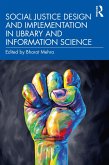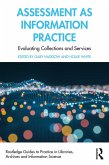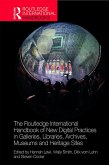Social Justice Design and Implementation in Library and Information Science (eBook, PDF)
Redaktion: Mehra, Bharat
39,95 €
39,95 €
inkl. MwSt.
Sofort per Download lieferbar

20 °P sammeln
39,95 €
Als Download kaufen

39,95 €
inkl. MwSt.
Sofort per Download lieferbar

20 °P sammeln
Jetzt verschenken
Alle Infos zum eBook verschenken
39,95 €
inkl. MwSt.
Sofort per Download lieferbar
Alle Infos zum eBook verschenken

20 °P sammeln
Social Justice Design and Implementation in Library and Information Science (eBook, PDF)
Redaktion: Mehra, Bharat
- Format: PDF
- Merkliste
- Auf die Merkliste
- Bewerten Bewerten
- Teilen
- Produkt teilen
- Produkterinnerung
- Produkterinnerung

Bitte loggen Sie sich zunächst in Ihr Kundenkonto ein oder registrieren Sie sich bei
bücher.de, um das eBook-Abo tolino select nutzen zu können.
Hier können Sie sich einloggen
Hier können Sie sich einloggen
Sie sind bereits eingeloggt. Klicken Sie auf 2. tolino select Abo, um fortzufahren.

Bitte loggen Sie sich zunächst in Ihr Kundenkonto ein oder registrieren Sie sich bei bücher.de, um das eBook-Abo tolino select nutzen zu können.
Social Justice Design and Implementation in Library and Information Science presents a range of case studies that have successfully implemented social justice as a designed strategy to generate community-wide changes and social impact.
- Geräte: PC
- ohne Kopierschutz
- eBook Hilfe
- Größe: 3.7MB
Andere Kunden interessierten sich auch für
![Social Justice Design and Implementation in Library and Information Science (eBook, ePUB) Social Justice Design and Implementation in Library and Information Science (eBook, ePUB)]() Social Justice Design and Implementation in Library and Information Science (eBook, ePUB)39,95 €
Social Justice Design and Implementation in Library and Information Science (eBook, ePUB)39,95 €![Assessment as Information Practice (eBook, PDF) Assessment as Information Practice (eBook, PDF)]() Assessment as Information Practice (eBook, PDF)34,95 €
Assessment as Information Practice (eBook, PDF)34,95 €![Negotiating Race and Rights in the Museum (eBook, PDF) Negotiating Race and Rights in the Museum (eBook, PDF)]() Katy BunningNegotiating Race and Rights in the Museum (eBook, PDF)42,95 €
Katy BunningNegotiating Race and Rights in the Museum (eBook, PDF)42,95 €![The Routledge International Handbook of New Digital Practices in Galleries, Libraries, Archives, Museums and Heritage Sites (eBook, PDF) The Routledge International Handbook of New Digital Practices in Galleries, Libraries, Archives, Museums and Heritage Sites (eBook, PDF)]() The Routledge International Handbook of New Digital Practices in Galleries, Libraries, Archives, Museums and Heritage Sites (eBook, PDF)46,95 €
The Routledge International Handbook of New Digital Practices in Galleries, Libraries, Archives, Museums and Heritage Sites (eBook, PDF)46,95 €![Fundraising for Impact in Libraries, Archives, and Museums (eBook, PDF) Fundraising for Impact in Libraries, Archives, and Museums (eBook, PDF)]() Kathryn K. MatthewFundraising for Impact in Libraries, Archives, and Museums (eBook, PDF)35,95 €
Kathryn K. MatthewFundraising for Impact in Libraries, Archives, and Museums (eBook, PDF)35,95 €![Artefacts, Archives, and Documentation in the Relational Museum (eBook, PDF) Artefacts, Archives, and Documentation in the Relational Museum (eBook, PDF)]() Mike JonesArtefacts, Archives, and Documentation in the Relational Museum (eBook, PDF)40,95 €
Mike JonesArtefacts, Archives, and Documentation in the Relational Museum (eBook, PDF)40,95 €![The Rise of the Must-See Exhibition (eBook, PDF) The Rise of the Must-See Exhibition (eBook, PDF)]() Anna LawrensonThe Rise of the Must-See Exhibition (eBook, PDF)42,95 €
Anna LawrensonThe Rise of the Must-See Exhibition (eBook, PDF)42,95 €-
-
-
Social Justice Design and Implementation in Library and Information Science presents a range of case studies that have successfully implemented social justice as a designed strategy to generate community-wide changes and social impact.
Dieser Download kann aus rechtlichen Gründen nur mit Rechnungsadresse in A, B, BG, CY, CZ, D, DK, EW, E, FIN, F, GR, HR, H, IRL, I, LT, L, LR, M, NL, PL, P, R, S, SLO, SK ausgeliefert werden.
Produktdetails
- Produktdetails
- Verlag: Taylor & Francis eBooks
- Seitenzahl: 332
- Erscheinungstermin: 29. Dezember 2021
- Englisch
- ISBN-13: 9781000528183
- Artikelnr.: 62934193
- Verlag: Taylor & Francis eBooks
- Seitenzahl: 332
- Erscheinungstermin: 29. Dezember 2021
- Englisch
- ISBN-13: 9781000528183
- Artikelnr.: 62934193
- Herstellerkennzeichnung Die Herstellerinformationen sind derzeit nicht verfügbar.
Bharat Mehra is EBSCO Endowed Chair in Social Justice and Professor in the School of Library and Information Studies at the University of Alabama, USA. His many research interests include diversity and inclusion advocacy, intercultural communication and communicative action, social justice in library and information science, community-engaged scholarship, and critical and cross-cultural studies. He has applied action research to further community-engaged scholarship while collaborating with racial/ethnic groups, international diaspora, sexual minorities, rural communities, low-income families, small businesses, and others, to represent their experiences and perspectives in the design of community-based information systems and services.
Figures; Tables; Contributors; Foreword: The Legacy of Promoting Social
Justice in Library and Information Science (Paul T. Jaeger); Introduction
(Bharat Mehra); I. EMERGING NEW RESPONSIBILITIES ; 1. Libraries Fighting
for Social Justice During the COVID-19 Pandemic (Nicole A. Cooke, Cyndee
Sturgis Landrum, and Jocelyn Pettigrew); 2. Role of Rural Libraries in
Supporting Social Well-being in their Communities: Participatory Research
to Promote Social Justice (Eli M. Guinnee and Margo E. Gustina); II.
REFLECTIVE CASE PRACTICES; 3. Understanding the Librarian Identity: The
Common Agency Within the Diversity of Public Librarianship (Vanessa Irvin);
4. Wilkes County Public Library's Involvement in the Food Justice Movements
in Rural North Carolina (Noah Lenstra and Rebecca Floyd); 5. A Public
Library's Response to Substance Abuse Recovery: Blount County Recovery
Court Life Skills Program (Kaurri C. Williams-Cockfield); 6. Digital
Archives and Inclusion of Underrepresented Groups: Case Studies of the
Voices Out Loud and Black in Appalachia Projects (Scott Sikes); III.
REACHING OUT: NEW RESEARCH APPROACHES AND STRATEGIES; 7. Positioning Social
Justice in a Black Feminist Information Activist Community Context: A Case
Study of African American Activist-Mothers in Chicago's Public Housing
(LaVerne Gray and Yiran Duan); 8. Everyday Information Practices of Migrant
Latinas Living in Boston (Mónica Colón-Aguirre and Janet Ceja Alcalá); 9.
Conceptualizing Co-mapping Knowledges to Promote Social Justice Outcomes
with Aboriginal Communities through Design Pedagogy (Jia Tina Du, Julie
Nichols, Stefan Peters, Darren Fong, Angelica Harris-Faull, Ning Gu, Anna
Leditschke, and Jannatul Fardous); 10. Multidisciplinary Perspectives for
an Integrative Critical Gerontology Information Framework (Joseph Winberry
and Bharat Mehra); IV. TRANSFORMING LIS EDUCATION; 11. The Mis-Education of
the Librarian: Addressing Curricular Injustice in the LIS Classroom through
Social Justice Pedagogy (Beth Patin, Melinda Sebastian, Jieun Yeon,
Danielle Bertolini, and Alexandra Grimm; 12. Creating Accessible Learning
Environments and Informing Social Justice through Inclusive Course Design
(Clayton A. Copeland and Kim M. Thompson); 13. Social Responsibility of
Libraries to Address Community Homelessness: Social Justice Actions in Two
LIS Courses (Julie Ann Winkelstein); 14. Indigenous-Engaged Education: A
Canadian Case (Toni Samek); 15. Designing for Social Justice in the MLIS
Curriculum: A Case Study of the University of Maryland (Morgan Adle, Paul
T. Jaeger, and Ursula Gorham); V. INSTRUMENTS OF ACTION AND CHANGE; 16. An
Autoethnographic Narrative of Institutional Injustice: Queer Resilience
through Use of Evidence and Memory (Donna Braquet); 17. Inspiring
Information Communities to Advance the UN Sustainable Development Goals:
Information Action Briefs for Social Transformation (Kendra S. Albright,
Clara M. Chu, Jia Tina Du, and Bharat Mehra); 18. Implementation of Social
Justice Design in Developing International Guidelines for LGBTQ+ Library
Resources, Services, and Programming (Rachel Wexelbaum, Julie Winkelstein,
and Michael David Miller); Index
Justice in Library and Information Science (Paul T. Jaeger); Introduction
(Bharat Mehra); I. EMERGING NEW RESPONSIBILITIES ; 1. Libraries Fighting
for Social Justice During the COVID-19 Pandemic (Nicole A. Cooke, Cyndee
Sturgis Landrum, and Jocelyn Pettigrew); 2. Role of Rural Libraries in
Supporting Social Well-being in their Communities: Participatory Research
to Promote Social Justice (Eli M. Guinnee and Margo E. Gustina); II.
REFLECTIVE CASE PRACTICES; 3. Understanding the Librarian Identity: The
Common Agency Within the Diversity of Public Librarianship (Vanessa Irvin);
4. Wilkes County Public Library's Involvement in the Food Justice Movements
in Rural North Carolina (Noah Lenstra and Rebecca Floyd); 5. A Public
Library's Response to Substance Abuse Recovery: Blount County Recovery
Court Life Skills Program (Kaurri C. Williams-Cockfield); 6. Digital
Archives and Inclusion of Underrepresented Groups: Case Studies of the
Voices Out Loud and Black in Appalachia Projects (Scott Sikes); III.
REACHING OUT: NEW RESEARCH APPROACHES AND STRATEGIES; 7. Positioning Social
Justice in a Black Feminist Information Activist Community Context: A Case
Study of African American Activist-Mothers in Chicago's Public Housing
(LaVerne Gray and Yiran Duan); 8. Everyday Information Practices of Migrant
Latinas Living in Boston (Mónica Colón-Aguirre and Janet Ceja Alcalá); 9.
Conceptualizing Co-mapping Knowledges to Promote Social Justice Outcomes
with Aboriginal Communities through Design Pedagogy (Jia Tina Du, Julie
Nichols, Stefan Peters, Darren Fong, Angelica Harris-Faull, Ning Gu, Anna
Leditschke, and Jannatul Fardous); 10. Multidisciplinary Perspectives for
an Integrative Critical Gerontology Information Framework (Joseph Winberry
and Bharat Mehra); IV. TRANSFORMING LIS EDUCATION; 11. The Mis-Education of
the Librarian: Addressing Curricular Injustice in the LIS Classroom through
Social Justice Pedagogy (Beth Patin, Melinda Sebastian, Jieun Yeon,
Danielle Bertolini, and Alexandra Grimm; 12. Creating Accessible Learning
Environments and Informing Social Justice through Inclusive Course Design
(Clayton A. Copeland and Kim M. Thompson); 13. Social Responsibility of
Libraries to Address Community Homelessness: Social Justice Actions in Two
LIS Courses (Julie Ann Winkelstein); 14. Indigenous-Engaged Education: A
Canadian Case (Toni Samek); 15. Designing for Social Justice in the MLIS
Curriculum: A Case Study of the University of Maryland (Morgan Adle, Paul
T. Jaeger, and Ursula Gorham); V. INSTRUMENTS OF ACTION AND CHANGE; 16. An
Autoethnographic Narrative of Institutional Injustice: Queer Resilience
through Use of Evidence and Memory (Donna Braquet); 17. Inspiring
Information Communities to Advance the UN Sustainable Development Goals:
Information Action Briefs for Social Transformation (Kendra S. Albright,
Clara M. Chu, Jia Tina Du, and Bharat Mehra); 18. Implementation of Social
Justice Design in Developing International Guidelines for LGBTQ+ Library
Resources, Services, and Programming (Rachel Wexelbaum, Julie Winkelstein,
and Michael David Miller); Index
Figures; Tables; Contributors; Foreword: The Legacy of Promoting Social
Justice in Library and Information Science (Paul T. Jaeger); Introduction
(Bharat Mehra); I. EMERGING NEW RESPONSIBILITIES ; 1. Libraries Fighting
for Social Justice During the COVID-19 Pandemic (Nicole A. Cooke, Cyndee
Sturgis Landrum, and Jocelyn Pettigrew); 2. Role of Rural Libraries in
Supporting Social Well-being in their Communities: Participatory Research
to Promote Social Justice (Eli M. Guinnee and Margo E. Gustina); II.
REFLECTIVE CASE PRACTICES; 3. Understanding the Librarian Identity: The
Common Agency Within the Diversity of Public Librarianship (Vanessa Irvin);
4. Wilkes County Public Library's Involvement in the Food Justice Movements
in Rural North Carolina (Noah Lenstra and Rebecca Floyd); 5. A Public
Library's Response to Substance Abuse Recovery: Blount County Recovery
Court Life Skills Program (Kaurri C. Williams-Cockfield); 6. Digital
Archives and Inclusion of Underrepresented Groups: Case Studies of the
Voices Out Loud and Black in Appalachia Projects (Scott Sikes); III.
REACHING OUT: NEW RESEARCH APPROACHES AND STRATEGIES; 7. Positioning Social
Justice in a Black Feminist Information Activist Community Context: A Case
Study of African American Activist-Mothers in Chicago's Public Housing
(LaVerne Gray and Yiran Duan); 8. Everyday Information Practices of Migrant
Latinas Living in Boston (Mónica Colón-Aguirre and Janet Ceja Alcalá); 9.
Conceptualizing Co-mapping Knowledges to Promote Social Justice Outcomes
with Aboriginal Communities through Design Pedagogy (Jia Tina Du, Julie
Nichols, Stefan Peters, Darren Fong, Angelica Harris-Faull, Ning Gu, Anna
Leditschke, and Jannatul Fardous); 10. Multidisciplinary Perspectives for
an Integrative Critical Gerontology Information Framework (Joseph Winberry
and Bharat Mehra); IV. TRANSFORMING LIS EDUCATION; 11. The Mis-Education of
the Librarian: Addressing Curricular Injustice in the LIS Classroom through
Social Justice Pedagogy (Beth Patin, Melinda Sebastian, Jieun Yeon,
Danielle Bertolini, and Alexandra Grimm; 12. Creating Accessible Learning
Environments and Informing Social Justice through Inclusive Course Design
(Clayton A. Copeland and Kim M. Thompson); 13. Social Responsibility of
Libraries to Address Community Homelessness: Social Justice Actions in Two
LIS Courses (Julie Ann Winkelstein); 14. Indigenous-Engaged Education: A
Canadian Case (Toni Samek); 15. Designing for Social Justice in the MLIS
Curriculum: A Case Study of the University of Maryland (Morgan Adle, Paul
T. Jaeger, and Ursula Gorham); V. INSTRUMENTS OF ACTION AND CHANGE; 16. An
Autoethnographic Narrative of Institutional Injustice: Queer Resilience
through Use of Evidence and Memory (Donna Braquet); 17. Inspiring
Information Communities to Advance the UN Sustainable Development Goals:
Information Action Briefs for Social Transformation (Kendra S. Albright,
Clara M. Chu, Jia Tina Du, and Bharat Mehra); 18. Implementation of Social
Justice Design in Developing International Guidelines for LGBTQ+ Library
Resources, Services, and Programming (Rachel Wexelbaum, Julie Winkelstein,
and Michael David Miller); Index
Justice in Library and Information Science (Paul T. Jaeger); Introduction
(Bharat Mehra); I. EMERGING NEW RESPONSIBILITIES ; 1. Libraries Fighting
for Social Justice During the COVID-19 Pandemic (Nicole A. Cooke, Cyndee
Sturgis Landrum, and Jocelyn Pettigrew); 2. Role of Rural Libraries in
Supporting Social Well-being in their Communities: Participatory Research
to Promote Social Justice (Eli M. Guinnee and Margo E. Gustina); II.
REFLECTIVE CASE PRACTICES; 3. Understanding the Librarian Identity: The
Common Agency Within the Diversity of Public Librarianship (Vanessa Irvin);
4. Wilkes County Public Library's Involvement in the Food Justice Movements
in Rural North Carolina (Noah Lenstra and Rebecca Floyd); 5. A Public
Library's Response to Substance Abuse Recovery: Blount County Recovery
Court Life Skills Program (Kaurri C. Williams-Cockfield); 6. Digital
Archives and Inclusion of Underrepresented Groups: Case Studies of the
Voices Out Loud and Black in Appalachia Projects (Scott Sikes); III.
REACHING OUT: NEW RESEARCH APPROACHES AND STRATEGIES; 7. Positioning Social
Justice in a Black Feminist Information Activist Community Context: A Case
Study of African American Activist-Mothers in Chicago's Public Housing
(LaVerne Gray and Yiran Duan); 8. Everyday Information Practices of Migrant
Latinas Living in Boston (Mónica Colón-Aguirre and Janet Ceja Alcalá); 9.
Conceptualizing Co-mapping Knowledges to Promote Social Justice Outcomes
with Aboriginal Communities through Design Pedagogy (Jia Tina Du, Julie
Nichols, Stefan Peters, Darren Fong, Angelica Harris-Faull, Ning Gu, Anna
Leditschke, and Jannatul Fardous); 10. Multidisciplinary Perspectives for
an Integrative Critical Gerontology Information Framework (Joseph Winberry
and Bharat Mehra); IV. TRANSFORMING LIS EDUCATION; 11. The Mis-Education of
the Librarian: Addressing Curricular Injustice in the LIS Classroom through
Social Justice Pedagogy (Beth Patin, Melinda Sebastian, Jieun Yeon,
Danielle Bertolini, and Alexandra Grimm; 12. Creating Accessible Learning
Environments and Informing Social Justice through Inclusive Course Design
(Clayton A. Copeland and Kim M. Thompson); 13. Social Responsibility of
Libraries to Address Community Homelessness: Social Justice Actions in Two
LIS Courses (Julie Ann Winkelstein); 14. Indigenous-Engaged Education: A
Canadian Case (Toni Samek); 15. Designing for Social Justice in the MLIS
Curriculum: A Case Study of the University of Maryland (Morgan Adle, Paul
T. Jaeger, and Ursula Gorham); V. INSTRUMENTS OF ACTION AND CHANGE; 16. An
Autoethnographic Narrative of Institutional Injustice: Queer Resilience
through Use of Evidence and Memory (Donna Braquet); 17. Inspiring
Information Communities to Advance the UN Sustainable Development Goals:
Information Action Briefs for Social Transformation (Kendra S. Albright,
Clara M. Chu, Jia Tina Du, and Bharat Mehra); 18. Implementation of Social
Justice Design in Developing International Guidelines for LGBTQ+ Library
Resources, Services, and Programming (Rachel Wexelbaum, Julie Winkelstein,
and Michael David Miller); Index







